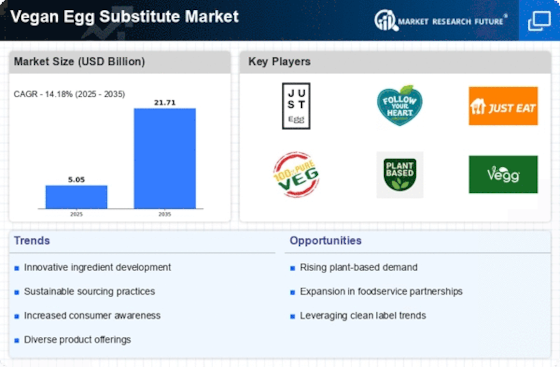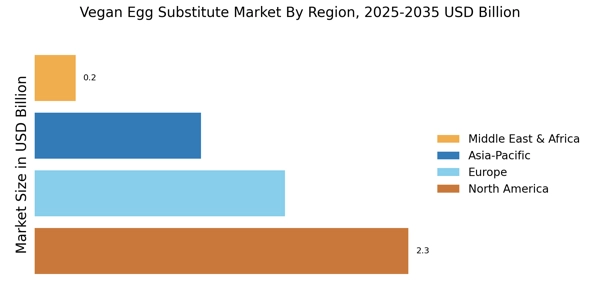Rising Demand for Plant-Based Diets
The Vegan Egg Substitute Market is experiencing a notable increase in demand as consumers shift towards plant-based diets. This trend is driven by a growing awareness of health benefits associated with plant-based eating, including lower cholesterol levels and reduced risk of chronic diseases. According to recent data, the plant-based food sector has seen a compound annual growth rate of approximately 11% over the past few years. This shift is not merely a fad; it reflects a fundamental change in consumer preferences, with many individuals seeking alternatives to traditional animal products. As more people adopt vegan or vegetarian lifestyles, the Vegan Egg Substitute Market is poised for substantial growth, catering to a diverse range of consumers who prioritize health and ethical considerations in their dietary choices.
Environmental Sustainability Concerns
Concerns regarding environmental sustainability are significantly influencing the Vegan Egg Substitute Market. The production of traditional eggs is associated with high greenhouse gas emissions, land use, and water consumption. In contrast, plant-based egg substitutes typically require fewer resources and have a lower environmental footprint. Research indicates that the adoption of vegan alternatives could reduce the ecological impact of food production. As consumers become increasingly aware of the environmental implications of their food choices, the demand for vegan egg substitutes is likely to rise. This trend aligns with broader movements advocating for sustainable agriculture and responsible consumption, positioning the Vegan Egg Substitute Market as a key player in the quest for more sustainable food systems.
Growing Interest in Culinary Innovation
Culinary innovation is a driving force behind the growth of the Vegan Egg Substitute Market. Chefs and home cooks alike are increasingly experimenting with plant-based ingredients, leading to a surge in creative recipes that utilize vegan egg substitutes. This trend is not only about replicating traditional dishes but also about exploring new culinary possibilities. As more restaurants and food service establishments incorporate vegan options into their menus, the visibility and appeal of vegan egg substitutes are enhanced. Additionally, social media platforms are amplifying this trend, with influencers showcasing innovative uses of these products. The growing interest in culinary experimentation is likely to propel the Vegan Egg Substitute Market forward, as consumers seek out diverse and exciting ways to incorporate plant-based alternatives into their diets.
Increased Availability in Retail Channels
The Vegan Egg Substitute Market is benefiting from increased availability across various retail channels. Supermarkets, health food stores, and online platforms are expanding their offerings of vegan products, making it easier for consumers to access egg substitutes. This trend is supported by the rising number of brands entering the market, each vying to capture the attention of health-conscious consumers. Data suggests that the retail sales of plant-based foods have surged, with many consumers actively seeking out vegan options during their shopping experiences. As the market continues to expand, the accessibility of vegan egg substitutes is likely to improve, further driving consumer adoption and solidifying the Vegan Egg Substitute Market's position in the food landscape.
Technological Advancements in Food Production
Technological advancements are playing a crucial role in shaping the Vegan Egg Substitute Market. Innovations in food science, such as the development of new plant-based proteins and emulsifiers, are enhancing the quality and versatility of vegan egg substitutes. These advancements enable manufacturers to create products that closely mimic the taste and texture of traditional eggs, thereby appealing to a wider audience. For instance, recent breakthroughs in fermentation technology have led to the creation of egg alternatives that not only perform well in cooking but also offer nutritional benefits. As these technologies continue to evolve, they are likely to drive further growth in the Vegan Egg Substitute Market, attracting both health-conscious consumers and those seeking to reduce their reliance on animal products.

















